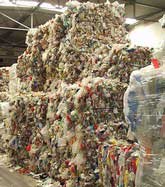The Institute of Building Materials, Ministry of Construction, has recently completed a research project on the technology for producing plastic plywood as a substitute for wood in construction, using household waste as raw material.
 |
| Plastic sorted from waste and bundled |
According to the outlined process, waste will be sorted to extract plastic waste, which is then cleaned, dried, and ground into small pieces. The plastic waste will be mixed with several other additives to produce the final product: plywood.
This type of material will be used for formwork, sound insulation, and partitions in construction projects that require high durability.
The research team states that plywood produced from waste is a cost-effective material, as it is manufactured using domestically designed and installed production equipment. The cost of a production line for plywood from waste with a capacity of 100 kg/hour is approximately 700 million VND.
Currently, the research team is seeking partners to transfer technology for this production line.
According to survey data, major cities currently generate about 200,000 tons of various types of plastic waste each year, with plastic bags and packaging accounting for approximately 75%. Most of this waste is either sent to landfills or manually recycled, resulting in environmental pollution and wasting resources for production.




















































